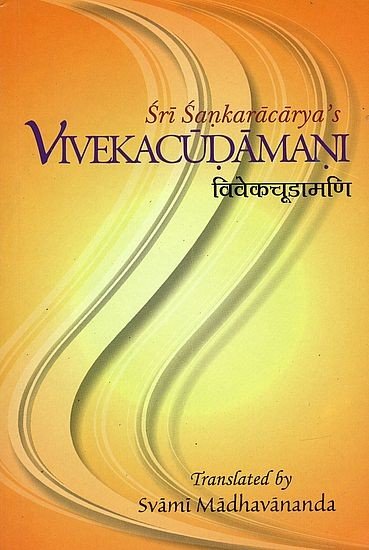Vivekachudamani
by Shankara | 1921 | 49,785 words | ISBN-13: 9788175051065
The Vivekachudamani is a collection of poetical couplets authored by Shankara around the eighth century. The philosophical school this compilation attempts to expose is called ‘Advaita Vedanta’, or non-dualism, one of the classical orthodox philosophies of Hinduism. The book teaches Viveka: discrimination between the real and the unreal. Shankara d...
Verse 198-199
अनादित्वमविद्यायाः कार्यस्यापि तथेष्यते ।
उत्पन्नायां तु विद्यायामाविद्यकमनाद्यपि ॥ १९८ ॥प्रबोधे स्वप्नवत्सर्वं सहमूलं विनश्यति ।
अनाद्यपीदं नो नित्यं प्रागभाव इव स्फुटम् ॥ १९९ ॥anāditvamavidyāyāḥ kāryasyāpi tatheṣyate |
utpannāyāṃ tu vidyāyāmāvidyakamanādyapi || 198 ||prabodhe svapnavatsarvaṃ sahamūlaṃ vinaśyati |
anādyapīdaṃ no nityaṃ prāgabhāva iva sphuṭam || 199 ||198-199. Avidya or Nescience and its effects are likewise considered as beginningless. But with the rise of Vidyā or realisation, the entire effects of Avidya, even though beginningless, are destroyed together with their root – like dreams on waking up from sleep. It is clear that the phenomenal universe, even though without beginning, is not eternal – like previous non-existence.
Notes:
[Their root—i. e. Avidya.
Previous non-existence—Pragabháva—a term of Hindu logic. When we say a thing comes into being at a definite point of time, we imply also that there was non-existence of that particular thing prior to the moment of its birth. And this ‘nonexistence’ is obviously beginningless. But it ceases as soon as the thing comes into being. Similarly, Avidya which means absence of Vidya or knowledge, even though beginningless, disappears when realisation comes.]
